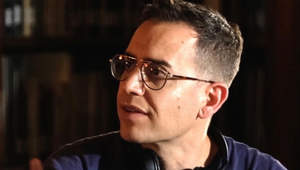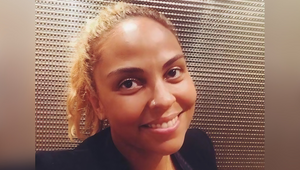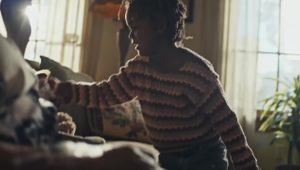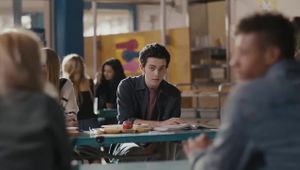
The Directors: Caswell Coggins

Caswell Coggins is an accomplished filmmaker whose work is strongly focused on commercials and branded content. Collaboration lies at the heart of his approach, as is a commitment to translating clients' ideas into captivating on-screen realisations.
His commercial ventures span collaborations with McCann, VCCP, and an impactful real life heroes campaign for Shell with Wunderman Thompson. Caswell just wrapped a social experiment for Heineken called “The Social Swap” as well as a healthcare campaign with MRM, New Jersey.
Beyond commercials, Caswell uses film to shine a light on social issues. He has captured compelling stories of intervention projects, from Ethiopian street children to young adults battling early-stage psychosis and is advancing the development of a series profiling young inner-city boxing communities.
Name: Caswell Coggins
Location: London
Repped by/in: Bodega Studios in the US
Awards: Ciclope, Promax UK, Promax Europe.
LBB> What elements of a script sets one apart from the other and what sort of scripts get you excited to shoot them?
Caswell> It’s the potential in a script that gets my attention. But I get excited when I start to talk with the creative team – to hear their vision, what they want to achieve, what I can bring to the party and together how we can realise it for their client.
LBB> How do you approach creating a treatment for a spot?
Caswell> It begins with listening. Undoubtedly the agency creative team has been through a hard-fought creative process before the script gets to me and I want to respect that. It’s good to really understand their ambitions for the film but crucially also what they don’t want. Then it’s all about living with the idea and allowing it to develop.
LBB> If the script is for a brand that you're not familiar with / don’t have a big affinity with or a market you're new to, how important is it for you to do research and understand that strategic and contextual side of the ad? If it’s important to you, how do you do it?
Caswell> Clearly the brand is why we are all here, so understanding the brand’s core values is crucial. This is one of the first questions I will ask on an agency call, then it’s up to me to do the necessary research. The most challenging projects are where the agency is taking the client in a new creative direction from what they are used to. In my experience, this requires a great deal of transparency and supporting the agency in bringing the client on the creative journey.
LBB> For you, what is the most important working relationship for a director to have with another person in making an ad? And why?
Caswell> First and foremost, the agency, that is key. From there, every relationship in the production process is equally important. I feel it’s my responsibility as the director to bring everyone with me from producer to cinematographer, designer to editor - they’ve all got to understand the vision. Great work comes from a great process!
LBB> What type of work are you most passionate about - is there a particular genre or subject matter or style you are most drawn to?
Caswell> There are two broad areas of work that I have a particular passion for, rich cinematic transition styled films involving moving sets or the use of visual devices that allow the story to move effortlessly from scenes to scene. The other is documentary style work that is character driven, of human interest and social impact.
LBB> What misconception about you or your work do you most often encounter and why is it wrong?
Caswell> People are not always aware of the work I do beyond advertising, I helped to spearhead. intervention projects with social impact like street children in Ethiopia, young adults with early-stage psychosis, and young people at risk of becoming involved with gangs and street crime.
LBB> Have you ever worked with a cost consultant and if so, how have your experiences been?
Caswell> I am very sensitive to budget discipline; however, this will not stop me trying to push the boundaries where possible. I’ll always be on hand though to have those conversations with my producer when the pressure is on.
LBB> What’s the craziest problem you’ve come across in the course of a production – and how did you solve it?
Caswell> Not a crazy problem as such, but when we were tasked to create films in Houston that featured heroes of Hurricane Harvey, one protagonist, Tom, faced a great deal of health challenges, and a very humble man didn’t consider anything he had contributed to the aid effort to be particularly special. For both these reasons he was very reluctant to appear on camera. We considered him and his story vital for the campaign, so leaving the cameras at home, I embarked on a series of conversations with him, eventually meeting him, finally he agreed. It was a necessary process of building trust, not untypical in a lot of the work I do involving real people and their personal stories.
LBB> How do you strike the balance between being open/collaborative with the agency and brand client while also protecting the idea?
Caswell> I’m a collaborator. That’s my thing. If we’ve gone about the process openly and transparently from the beginning, then I shouldn’t need to protect anything. There are always many ways to tell a story so it’s about listening to one another and finding an accord, in the end everyone should want to take ownership of the film.
LBB> What are your thoughts on opening the production world to a more diverse pool of talent? Are you open to mentoring and apprenticeships on set?
Caswell> My crews are always a rich mix of diverse talent. It’s important to me. Personally, I’m open to giving absolutely anybody an opportunity who wants to learn, bring their energy and add value to the creative process. My own apprenticeship in the film industry began on set initially as a runner, I learnt from there, mentored by HOD’s from camera to production design, I watched and listened. So, I am a firm believer that being on set is still an incredible way to learn. As film makers we must always be generous in giving opportunities to upcoming talent.
LBB> How do you feel the pandemic is going to influence the way you work into the longer term? Have you picked up new habits that you feel will stick around for a long time?
Caswell> It has allowed us to broaden our ways of communicating and solving complex problems at distance, but to be honest I am pleased to be able to sit round a table with people again!
LBB> Your work is now presented in so many different formats - to what extent do you keep each in mind while you're working (and, equally, to what degree is it possible to do so)?
Caswell> Generally, I begin with a 16:9 frame and go from there. The multiple platforms and their various formats are here to stay so, of course, I’ve embraced it. Like everything else, I plan carefully for all the required deliverables, so it’s important, when possible, to have that information upfront since we factor that in when considering framing and composition.
LBB> What’s your relationship with new technology and, if at all, how do you incorporate future-facing tech into your work (e.g. virtual production, interactive storytelling, AI/data-driven visuals etc)?
Caswell> I love to achieve as much in camera as possible and often this discipline can produce great results. That said, I love new tech and all its possibilities as it can work for us in wonderful ways to assist in realising a particular creative challenge or ambition that is beyond our real time visual capability.
LBB> Which pieces of work do you feel really show off what you do best – and why?
Caswell> Sky Sports: ‘Festive Football’
I felt this was just one of those great ideas from a creative team. I relish the challenge of an idea like this, to create a world where it had snowed footballs overnight. Delivering the effect had to be such a closely balanced collaboration between, designer, DOP and, critically, the post-production team as the real challenge was making millions of footballs appear real. Clearly there was a limit as to how many actual footballs we could have on set at any one time, although I think, in the end, we needed up to a thousand of them at times for the interactions with the footballs to appear real and therefore sell the wider picture.
Coronation Street: ‘Then, Now, and Forever’
ITV’s ‘Coronation Street’ is undoubtedly the most iconic soap opera ever to be screened in the UK so it was a big deal to be given the task of creating a film that would celebrate the show’s unrivalled 50-year anniversary on British television. To go back across half a century of programming to recreate truly iconic moments from the series was a perfect opportunity to deploy the device of transition to create that sense of an epic journey from past to present.
Hurricane Heroes: ‘Tom’
This is a film I referenced in one of my previous answers. I simply love capturing real stories and conveying them to an audience as thoughtfully and sensitively as I can. I found Tom to be a most courageous man in every way, and it was a privilege to be able to tell his very moving story.
Switch Guarantee: ‘Make It Easier’
I love the theatre and particularly the way in which theatre designers can conjure up a world, often utilising very limited settings that allow audiences to fill out the picture for themselves. So, when the agency shared their vision for this script, the approach we took reflected this theatrical design technique - to broadly limit what was on set, yet still deliver a satisfyingly complete visual picture.















